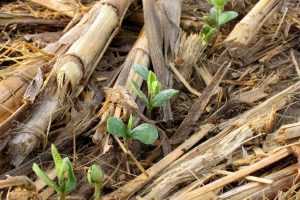A recent paper by W.K. Kellogg Biological Station scientists and others suggests that the best time to transition to no-till farming practices may have been decades ago. The second-best time may be now. The study’s results speak to the importance of long-term agricultural and ecological research.
KBS postdoctoral researcher Sarah Cusser is the lead author on the paper, “Long-term research avoids spurious and misleading trends in sustainability attributes of no-till.” KBS faculty Nick Haddad and G. Philip Robertson, among others, contributed.
The study, published in Global Change Biology, used data from annual cropping plots at a KBS Long-term Ecological Research program site to look at how employing continuous no-till versus conventional agriculture practices affect profitability and ecological health over a span of nearly 30 years.
They found that continuous no-till management eventually resulted in increased values in yield and soil water availability, and that surveys of 10 years or less often returned conflicting results that were not representative of the longer-term benefits. Positive effects were most pronounced after the 15-year mark. Financial losses were present in the early years of the study, though after some 13 years, those losses had been recouped.
“Our economic analysis was conservative,” says Haddad. “Farmers will adopt innovative practices that reduce cost of conversion to no-till, and benefits will accrue even sooner than we show.”
Cusser and her colleagues found that the study results were “…consistent with recommendations to support the long-term adoption of continuous no-till management despite initial losses.”
Haddad adds, “The consistent rise in yield in no-till relative to conventional agriculture is stunning. The trend is up through the entire three decade study. It has not yet leveled off.”
More information on no-till management.
Related articles
Long-term data reveals how no-till agriculture increases crop yields and environmental gains over the long haul | May 18, 2020
No-till agriculture increases crop yields, environmental gains over long haul | May 22, 2020
‘We have one Earth’: Researchers work to boost farm production without causing more harm | June 19, 2020
MSU study finds no-till farming yields long-term economic benefits | July 31, 2020
MSU study finds no-till farming yields long-term economic benefits | Aug. 7, 2020


A legacy of conservation; a commitment to sustainability.
3700 E. Gull Lake Drive
Hickory Corners, MI 49060
(269) 671-5117
info@kbs.msu.edu